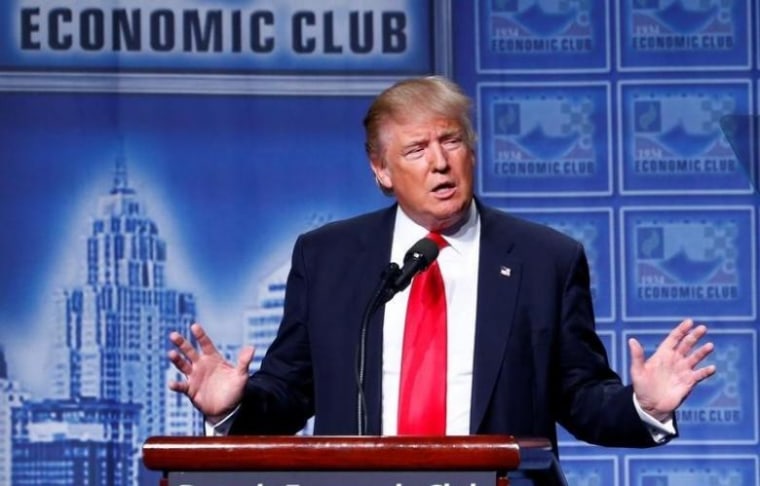Donald Trump ran on a campaign to bring back American jobs, but some economists say his plans for curtailing or outright abandoning decades' worth of global trade networks won't bring back 1950s-era manufacturing jobs and could instead produce recession-triggering levels of inflation and higher prices for American shoppers.
“What most people don’t realize is that those jobs were doomed anyway, and no amount of protectionist trade barriers are going to bring them back,” said James J. Angel, an associate professor at Georgetown University’s McDonough School of Business.
Will he ditch his campaign promises?
Financial professionals are clinging to the hope that Trump discards his protectionist ways once he enters office.
“We’ve certainly seen candidates who become presidents in the past, who say one thing during the election cycle but moderate their language a great deal once they’re president,” said Joe Heider, founder of Cirrus Wealth Management.
The issue is that corporations — already sitting on piles of cash — would be inclined to hold back on hiring or investment until that happened, he said.
And if Trump were to follow through on his campaign-trail promises, economists say all bets are off.
American jobs rely on international trade
“If he wants to create jobs, drying up international trade is not the way to do it,” Angel said, since getting American-made goods out into the global market depends on reciprocity with our trading partners.
“If all he does is walk away from all of our trade deals… that would do serious, lasting damage to the global economy as well as the very people he’s promised to help,” Angel said.
This harm could touch investors, as well. “Mr. Trump’s anti-international trade posture would be not good for the financial prospects of probably the 1000 leading companies in the U.S.,” said Lawrence White, an economics professor at New York University’s Stern School of Business.
“Mr. Trump claims he’s going to bring jobs back to America. That would seem to favor companies like steel companies, coal, maybe there are a few sectors where companies might benefit from the restraints on trade. But as a general matter, big companies are unlikely to be benefiting from the Trump agenda,” White said, because of their international exposure and global supply chains. “To go back to the 1950s would be a wrenching experience.”
Since 7 percent of American jobs and 14 percent of our GDP depend on exports, restrictions on imports would put millions of jobs at risk rather than grow the number of jobs available, Morgan Stanley analysts said in a note to investors the day after the election.
“Attempts to protect US manufacturers through renegotiating free-trade agreements may backfire, by hampering global supply chains and export markets,” they wrote.
As a candidate, Trump proposed to kill the 12-nation Trans-Pacific Partnership, “renegotiate” the North American Free Trade Agreement, label China a currency manipulator and impose tariffs on imports coming from countries like China and Mexico.
Higher tariffs mean higher prices
“China and Mexico loom large in global cross-border supply chains, especially in electronics and motor vehicles,” said Marcus Noland, executive vice president and director of studies at the Peterson Institute for International Economics and one of the authors of an analysis that found Trump’s trade ideas would cost more than 4 million private-sector American jobs if they were implemented.
“Tariffs would immediately disrupt the supply chain of basically all American multinationals working in electronics and motor vehicles as well as many others,” Noland warned.
Economists warned not only of job losses, but of higher inflation and higher prices on store shelves.
“It would make goods in the United States more expensive and I don’t know how comfortable the American public is with higher prices for everything at Target and Walmart,” said Mitchell Goldberg, president of ClientFirst Strategy, Inc.
“Go ahead and build an iPhone just in the U.S. It’ll cost a lot more money.”
The American consumer’s singular focus on low prices has contributed to the current situation, Goldberg said. “China dumps cheap products in the U.S. where people are looking for bargains. It’s a pretty simple equation,” he said. “Go ahead and build an iPhone just in the U.S. It’ll cost a lot more money.”
By raising the cost of production, Trump’s trade policies put the country at risk of higher inflation, which could push up interest rates and lead to a recession, Angel warned. Higher inflation, especially if it accelerates rapidly, would have ramifications on everything from the national debt to the mortgage market.
“Given the massive size of the federal deficit that’s going to blast a huge hole in the national budget,” Angel said. “He’s sitting on a time bomb.”
“Depending on how you think the Fed might react to the rise in import prices, you could see rising interest rates… so you could see something like stagflation,” Noland said. “It’s not a very pleasant scenario to contemplate.”
